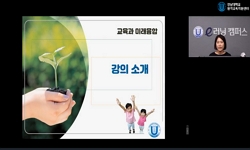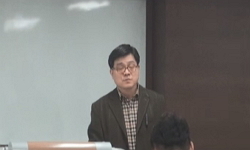This article sheds new light on Adam Smith’s discourse on education in Chapter 1 of Book 5 in < Wealth of Nations >. According to dominant interpretation Smith’s discourse on education was focused on proving that private schools at which edu...
http://chineseinput.net/에서 pinyin(병음)방식으로 중국어를 변환할 수 있습니다.
변환된 중국어를 복사하여 사용하시면 됩니다.
- 中文 을 입력하시려면 zhongwen을 입력하시고 space를누르시면됩니다.
- 北京 을 입력하시려면 beijing을 입력하시고 space를 누르시면 됩니다.

애덤 스미스의 교육론: 자연철학과 도덕철학의 종합을 위하여 = Adam Smith’s Discourse on Education: Towards a Synthesis of Natural and Moral Philosophy
한글로보기https://www.riss.kr/link?id=A106986702
- 저자
- 발행기관
- 학술지명
- 권호사항
-
발행연도
2018
-
작성언어
-
- 주제어
-
KDC
300
-
등재정보
KCI등재
-
자료형태
학술저널
-
수록면
133-155(23쪽)
-
KCI 피인용횟수
0
- DOI식별코드
- 제공처
-
0
상세조회 -
0
다운로드
부가정보
다국어 초록 (Multilingual Abstract)
This article sheds new light on Adam Smith’s discourse on education in Chapter 1 of Book 5 in < Wealth of Nations >. According to dominant interpretation Smith’s discourse on education was focused on proving that private schools at which education customer (students or their parents) bear education expenditures guarantee better education quality than public schools and that practical vocational education as investment in human capital contributing to enhancing productivity is important than literary education. Such a interpretation neglects that it was due to negative effect of division of labor, namely deterioration of moral and social judgement of common people that Smith found government’s education policy necessary. Here two points deserve attention. First, Smith described in detail the historical change of moral philosophy from ancient Greece to his own time. Second, Smith’s proposal that geometry and mechanics should be taught as introduction not only to the most useful sciences but also to “the most sublime sciences,” hints that he meant more than practical vocal education. Both points allude to Smith’s concern for moral philosophy in his discourse, which previous studies have not yet given its deserving attention to. This article tries to make up for this interpretative deficiency.
It was at first discovered that “the most sublime sciences” meant in the circle of the European intellectuals natural and moral philosophy which investigate into connecting principles of various phenomena in the physical and human world. And geometry and physics (’mechanics’) which Smith described as introduction to the most sublime sciences deemed in the Western philosophical tradition as instruments for deduction and induction. They were synthesized by Newton into a scientific method which stressed observation and experiment and served as important basis also for moral philosophy. In this tradition Smith expected that by means of geometry and physics children of common people would be trained in deductive and inductive thinking which prevented them from falling into ascetism which relied on abstract speculation without observation of concrete human reality as well as into casuisty which, overwhelmed by complexities of reality, prescribed too many moral rules without coherent principles. By applying methods of careful observation and systematic inference developed in natural philosophy, to moral philosophy young people should learn to observe carefully human interactions in society and infer from the observations general moral rules, which take also peculiarities of human interactions into consideration, and apply these to various situations. In short Smith was not concerned only for practical vocational education of common people but also for educating them to persons with reliable moral character and social and political insights. This article finally derives from this new insight into Smith’s educational concerns some implications for contemporary education.
참고문헌 (Reference)
1 Hume, D., "Treatise of Human Nature, L.A" Oxford University Press 1967
2 Smith, A., "The Theory of Moral Sentiments" Oxford University Press 1976
3 Turnbull, G., "The Principles of Moral Philosophy: An Enquiry into the wise and good governement of the moral world" John Noon 1740
4 Newton, I., "The Principia - Mathematical Principles of Natural Philosophy" University of California Press 1999
5 Cassierer, E., "The Philosophy of the Enlightenment" Princeton University Press 1979
6 Hibben, J. G., "The Philosophy of the Enlightenment" Charles Scribner’s Sons 1910
7 Davis, J. A., "The Market-Oriented University: Transforming Higher Education" Edward Elger 2016
8 Ross, I. S., "The Life of Adam Smith" Oxford University Press 2010
9 Patten, S. N., "The Educational Value of Political Economy" 5 (5): 7-36, 1890
10 Gracián, B., "The Critick" Oxford 2003
1 Hume, D., "Treatise of Human Nature, L.A" Oxford University Press 1967
2 Smith, A., "The Theory of Moral Sentiments" Oxford University Press 1976
3 Turnbull, G., "The Principles of Moral Philosophy: An Enquiry into the wise and good governement of the moral world" John Noon 1740
4 Newton, I., "The Principia - Mathematical Principles of Natural Philosophy" University of California Press 1999
5 Cassierer, E., "The Philosophy of the Enlightenment" Princeton University Press 1979
6 Hibben, J. G., "The Philosophy of the Enlightenment" Charles Scribner’s Sons 1910
7 Davis, J. A., "The Market-Oriented University: Transforming Higher Education" Edward Elger 2016
8 Ross, I. S., "The Life of Adam Smith" Oxford University Press 2010
9 Patten, S. N., "The Educational Value of Political Economy" 5 (5): 7-36, 1890
10 Gracián, B., "The Critick" Oxford 2003
11 West, E. G., "Private versus Public Education: A Classical Economic Dispute" 72 (72): 465-475, 1964
12 Cropsey, J., "Polity and Economy - An Interpretation of the principles of Adam Smith" Martinus Nijhoff 1957
13 Chubb, J. E., "Politics, markets and America's schools" The Brooking Insitution 1990
14 Brandt, R., "Philosophical Methods, in: The Cambridge History of Eighteenth/Century Philosophy, Vol. I" Cambridge University Press 137-159, 2006
15 Newton, I., "Opticks" Dover Publications 1952
16 Montes, L., "Newton’s real influence on Adam Smith and its context" 32 (32): 555-576, 2008
17 Kim, Y., "New History of Science" Dasan Publishing 2007
18 Laubenbacher, R., "Mathematical Expeditions-Chronicles by the Explorers, with 94 Illustrations" Springer-Verlag 1999
19 Gale, G., "Leibniz, Peter the Great, and the modernization of Russia or Adventrues of a Philosopher-King in Russia" Divinatio 7-36, 2005
20 Knapp, J. C., "Leadership and Culture" Praeger 2009
21 Martin, M. G., "Issues in Economic Thought" Nova Science Publishers 135-150, 2010
22 Hetherington, N.S., "Isaac Newton's Influence on Adam Smith's Natural Laws in Economics" 44 (44): 497-505, 1983
23 Milton, J. R., "Induction before Hume" 38 (38): 49-74, 1987
24 Lee, J. W., "Historical Backgrounds and History of Geometry" Gyeongmunsa 2011
25 Röd, W., "Heureka. Philosophische Streifzüge im Licht von Anekdoten" Eunhaengnamu 2014
26 Spinoza, B., "Ethics" J. M. Dent & Sons 1941
27 Smith, A., "Essays on Philosophical Subjects" T. Cadell Jr. and W. Davis 1795
28 Blaug, M., "Essays on Adam Smith" Clarendon Press 568-599, 1975
29 Blaug, M., "Economic Theory in Retrospect" Cambridge University Press 1978
30 Ball, P., "Critical Mass: How One Thing Leads to Another" Kachi 2008
31 Smith, A., "An Inquiry into the Nature and Causes of the Wealth of Nations" Modern Library 1937
32 MacLaurin, C., "An Account of Sir Isaac Newton’s Philosophical Discoveries, in Four Books" J. Nourse 1775
33 Campbell, T. D., "Adam Smith’s science of morals" Routledge 1971
34 Kim, S., "Adam Smith’s discourse on education in the Wealth of Nations" 28 (28): 1-21, 2014
35 Reisman, D., "Adam Smith’s Sociological Economics" Harper & Row Publishers Inc 1976
36 Alvey, J., "Adam Smith-optimist or pessimist?: a new problem concerning the teleological basis of commercial society" Ashgate 2003
37 Mueller, P., "Adam Smith on Public Policy: Education"
38 Spengler, J. J., "Adam Smith on Human Capital" 67 (67): 32-36, 1977
39 Rosenberg, N., "Adam Smith and modern political economy: bicentennial essays on The wealth of nations" 19-34, 1979
40 Redman, D. A., "Adam Smith and Isaac Newton" 40 (40): 201-230, 1993
동일학술지(권/호) 다른 논문
-
질서자유주의적 관점에서 본 중국의 공공인프라 구축사업에 관한 연구
- 한국질서경제학회
- Gong Bao Cheng
- 2018
- KCI등재
-
AHP를 이용한 조직적 측면에서의 제품혁신을 위한 의사결정 우선순위의 분석:대구지역 자동차 부품산업을 중심으로
- 한국질서경제학회
- 박주홍
- 2018
- KCI등재
-
경제적 민주화, 외국인 직접투자, 경제성장: 미얀마 실증분석과 북한에 대한 시사점
- 한국질서경제학회
- 윤형모 ( Hyung-mo Yoon )
- 2018
- KCI등재
-
- 한국질서경제학회
- 이선호 ( Sunho Lee )
- 2018
- KCI등재
분석정보
인용정보 인용지수 설명보기
학술지 이력
| 연월일 | 이력구분 | 이력상세 | 등재구분 |
|---|---|---|---|
| 2022 | 평가예정 | 재인증평가 신청대상 (재인증) | |
| 2019-01-01 | 평가 | 등재학술지 유지 (계속평가) |  |
| 2016-01-01 | 평가 | 등재학술지 유지 (계속평가) |  |
| 2012-01-01 | 평가 | 등재학술지 선정 (등재후보2차) |  |
| 2011-01-01 | 평가 | 등재후보 1차 PASS (등재후보1차) |  |
| 2010-01-01 | 평가 | 등재후보학술지 유지 (등재후보2차) |  |
| 2009-01-01 | 평가 | 등재후보 1차 PASS (등재후보1차) |  |
| 2007-01-01 | 평가 | 등재후보학술지 선정 (신규평가) |  |
학술지 인용정보
| 기준연도 | WOS-KCI 통합IF(2년) | KCIF(2년) | KCIF(3년) |
|---|---|---|---|
| 2016 | 0.46 | 0.46 | 0.43 |
| KCIF(4년) | KCIF(5년) | 중심성지수(3년) | 즉시성지수 |
| 0.42 | 0.4 | 0.668 | 0.24 |




 KCI
KCI KISS
KISS






